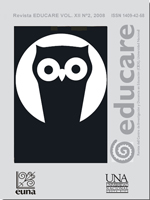Construcción del perfil profesional docente de sétimo año: respuesta a una necesidad actual
DOI:
https://doi.org/10.15359/ree.12-2.2Keywords:
high school, seventh grade, teachers’ profile, desertion, permanence, school failureAbstract
In our country, the seventh grade is the level with the highest desertion and failure rate in high school. This was the main reason that motivated this group of researchers to define the teachers’ professional profile at this level. Based on a definition of the teachers’ characteristics, the concept of how a profile should be, the age features of seventh graders and all those aspects that benefit the teaching-learning processes, the optimum and required profile of the seventh graders’ teachers is proposed.
References
Bar, G. (1999). Perfil y competencias del docente en el contexto institucional Educativo. Versión
electrónica. Trabajo presentado en el I Seminario taller sobre Perfil del docente y
estrategias de formación, realizado en Lima, Perú. Recuperado el 12 de junio de 2007, de
Castro, M., Díaz, M., Fonseca, H., Moraga, L., Umaña, W. y Ruíz, S. (2007). Factores de éxito en
la transición de 6º a 7º año. Heredia, Costa Rica: Universidad Nacional.
Costa Rica. Ministerio de Educación Pública. (2001). Estructuras curriculares III Ciclos y
educación diversificada (todas las modalidades). San José: Autor.
Díaz Barriga, F. y Hernández, G. (2002). Estrategias docentes para un aprendizaje significativo.
Una interpretación constructivista. (2ª ed.). México: Editorial Mc‐Graw Hill.
Papalia, D., Wendkos, S. y Duskin, R. (2005). Desarrollo humano. (9ª ed.). México: Editorial
McGraw‐Hill.
Proyecto Estado de la Nación en Desarrollo Humano Sostenible. (2005). Undécimo informe.
Estado de la Educación Costarricense Estado de la Nación en Desarrollo Sostenible. San
José, Costa Rica: Proyecto Estado de la Nación.
Proyecto Estado de la Nación en Desarrollo Humano Sostenible. (2006). Duodécimo informe.
Estado de la Nación en Desarrollo Sostenible. San José, Costa Rica: Proyecto Estado de la
Nación.
Ramos, M. (1996). Perfil del docente hoy y su rol de facilitador humanista. Facultad de Ciencias
de la Educación, (13), 6, 341‐358.
Recio, A. (1993). El perfil del educador para el Siglo XXI. Tablero, 46, 22‐27.
Ruíz, A. (2006). Universalización de la educación secundaria y reforma educativa. San José:
Editorial de la Universidad de Costa Rica‐CONARE.
Shön, D. (1998). El profesional reflexivo. Barcelona: Paidós.
Valenzuela, A. (1996). Perfil profesional del educador para la enseñanza media. Perspectiva
educacional, 26, 117‐126.
Downloads
Published
How to Cite
Issue
Section
License
1. In case the submitted paper is accepted for publication, the author(s) FREELY, COSTLESS, EXCLUSIVELY AND FOR AN INDEFINITE TERM transfer copyrights and patrimonial rights to Universidad Nacional (UNA, Costa Rica). For more details check the Originality Statement and Copyright Transfer Agreement
2. REUTILIZATION RIGHTS: UNA authorizes authors to use, for any purpose (among them selfarchiving or autoarchiving) and to publish in the Internet in any electronic site, the paper´'s final version, both approved and published (post print), as long as it is done with a non commercial purpose, does not generate derivates without previous consentment and recognizes both publisher's name and authorship.
3. The submission and possible publication of the paper in the Educare Electronic Journal is ruled by the Journal’s editorial policies, the institutional rules of Universidad Nacional and the laws of the Republic of Costa Rica. Additionally, any possible difference of opinion or future dispute shall be settled in accordance with the mechanisms of Alternative Dispute Resolution and the Costa Rican Jurisdiction.
4. In all cases, it is understood that the opinions issued are those of the authors and do not necessarily reflect the position and opinion of Educare, CIDE or Universidad Nacional, Costa Rica. It is also understood that, in the exercise of academic freedom, the authors have carried out a rogorous scientific-academic process of research, reflection and argumentation thar lays within the thematic scope of interest of the Journal.
5. The papers published by Educare Electronic Journal use a Creative Commons License:














 The articles published by Educare Electronic Journal can be shared with a Creative Commons License:
The articles published by Educare Electronic Journal can be shared with a Creative Commons License: 



